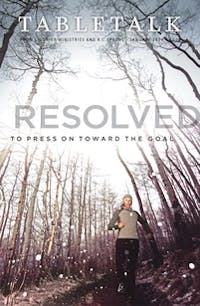
Request your free, three-month trial to Tabletalk magazine. You’ll receive the print issue monthly and gain immediate digital access to decades of archives. This trial is risk-free. No credit card required.
Try Tabletalk NowAlready receive Tabletalk magazine every month?
Verify your email address to gain unlimited access.
I wish I had been told when I was young about the lie all of us naturally believe. This lie is explained to us by Jesus when he said to the Jews who had believed on Him: “If you continue in my word, you are truly my disciples, and you will know the truth, and the truth will set you free.” They answered him: “We are offspring of Abraham, and have never been enslaved to anyone. How is it that you say, ‘You will become free’?” (John 8:33).
This is an extraordinary response! How can these Jews say that “they have never been enslaved to anyone”? Had they forgotten slavery in Egypt, bricks without straw, plagues, the Passover, and the Red Sea? In fact, redemption from slavery was part of their very identity. Not only was it their historical identity, but their deliverance from bondage in Egypt was celebrated each year at Passover.
Jesus did not bother enumerating these facts. He went immediately to the basic point of human reality: “Everyone who commits sin is a slave to sin. …if the Son sets you free you will be free indeed” (John 8:34–36). Why did they lie? Because it is our nature to deny our bondage and claim to be free. We believe and tell this lie because we are sinners.
Archbishop William Temple gives us the posture from which we continue to be misled about freedom:
“When we open our eyes as babies we see the world stretching out around us; we are in the middle of it; all we see is determined by the relation of all objects to ourselves. This will be true as long as we live. I am the center of the world I see; where the horizon is depends on where I stand. The same is true of our mental and spiritual vision. Some things hurt us; we hope they will not happen again; we call them bad. Some things please us; we hope they will happen again; we call them good. Our standard of value is the way things affect ourselves. So each of us takes his place in the center of his own world. But I am not the center of the world, nor do I determine what is good or bad. I am not the center; God is.”
It is quite “natural,” then, for all of us to feel that we are free in getting what we want. But our lives are individual “centers” colliding with others’ centers, among children in the back of the car, schools, businesses, towns, countries, and the world. We think that we are free when our wills are fulfilled and that we are not free when our wills are frustrated. This universal self-as-center is the cause of litigation, divorce, rivalry, murder, war, and genocide. It is not a condition of freedom but one of bondage.
Our situation, however, is not quite so simple. Sometimes our wills coincide, not collide, with other wills. Some measure of freedom is achieved by civilization itself, by cooperation, education, teamwork, law, and order. Where these matters are absent it becomes rapidly apparent how unfree we are. In a civilized society we may pass through a stage of making ourselves do homework to the discovery of pleasure in literature and math, from making oneself practice piano lessons to the delight in playing Mozart, from undesired discipline of caring for a senile parent to being surprised how one misses that relationship after the funeral. These can be small incidences of true freedom beyond restrained wills. Literature, science, and human caring are surely parts of the abundant life Christ came to give.
Amidst the luxury of a high civilization with the frustrations from control and constraints on our wills, we continue to be like the Jews who told Jesus that they had never been in bondage. We keep telling ourselves that we are free if there are no restraints or inhibitions controlling what we do. But this ignores our condition as described by William Temple. If unrestrained, we are a danger to ourselves and to others. Hence, we have parents, police, and governments to control the self-centered, non-free condition of human nature that we sinners persist in calling “freedom.” When we “freely” choose to do evil is it not clear that the choice is bondage, not freedom? We need repeatedly to hear our Lord’s words: “Everyone who commits sin is a slave to sin. [When] the Son sets you free you are free indeed.”
How can this be? Parents and discipline can control, inhibit, restrain and, with difficulty, domesticate children, but that is not the same as being free. If we are not free because our very inborn wills desire to be the center, and if we are not the center and God is, how can we be free?
Well, it is impossible! It is impossible just as Nicodemus knew when Jesus told him that he must be born again. But the miracle of the impossible possibility is regeneration — to be born again. What God has provided in Jesus Christ is the new center that makes us truly free. When we are baptized into the family of Christ we are given a new center. As we grow in this family we become increasingly aware that we are grounded in the everlasting and final triumph of God’s victory over injustice, selfishness, and death. Only in God’s merciful providence is true freedom to be found. As C.K. Barrett shows in his commentary on John (p. 285): “Being made free is nothing other than a synonym for salvation.”
